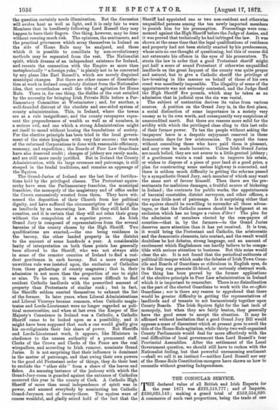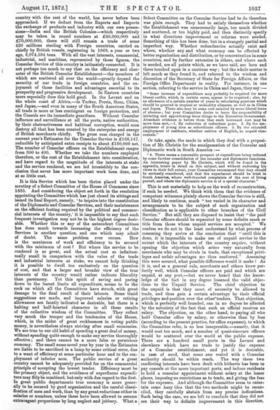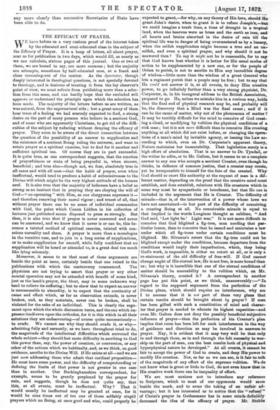THE CONSULAR SERVICE.
TETdeclared value of all British and Irish Exports for he year 1871 was £222,519,777; and of Imports, £330,035,143; making a grand total of £552,554,920. A commerce of such vast proportions, being the trade of one
country with the rest of the world, has never before been approached. If we deduct from the Exports and Imports the exchange of products and industry with our own posses- sions—India and the British Colonies—which respectively may be taken in round numbers at £60,000,000 and £70,000,000, there will still remain a trade of some 420 millions sterling with Foreign countries, carried on chiefly by British vessels, registering in 1869, a year or two ago, 6,074,594 tons. With all the vast interests, commercial, industrial, and maritime, represented by these figures, the Consular Service of this country is intimately connected. It is not perhaps too much to say that on the efficiency and char- acter of the British Consular Establishment—the members of which are scattered all over the world—greatly depend the security- of our trade in foreign countries, and the en- joyment of those facilities and advantages essential to its prosperity and progressive development. In Eastern countries more especially does this hold good. In the Levant and on the whole coast of Africa,—in Turkey, Persia, Siam, China, and Japan,—and even in many of the South American States, all trade is more or less contingent on foreign protection, and the Consuls are its immediate guardians. Without Consular influence and surveillance at all the ports, native authorities, by their obstructiveness and habitual corruption, would soon destroy all that has been created by the enterprise and energy of British merchants chiefly. The gross sum charged in the current year's Estimates for the Consular Service is £168,147, reducible by anticipated extra receipts to about £130,000 net. The number of Consular officers on the Establishment ranges from 300 to 400. Whether we take the numbers employed therefore, or the cost of the Establishment into consideration, and have regard to the magnitude of the interests at stake and the service rendered, we are led irresistibly to the con- clusion that never has more important work been done, and at so little cost.
It is this Service which has been thrice placed under the scrutiny of a Select Committee of the House of Commons since 1835. And considering the object set forth in the resolution appointing the Committee which has just closed its sittings and issued its final Report, namely, to inquire into the constitution of the Diplomatic and Consular Services, and their maintenance on the efficient footing required by the political and commer- cial interests of the country,' it is impossible to say that such frequent investigation may not be in the highest degree desir- able. Whether this or any of the antecedent Committees has done much towards increasing the efficiency of the Services is another question, and one which may admit of doubt. The same problem ever recurs. How is the maximum of work and efficiency to be secured with the minimum of cost ? But where the service to be rendered is so great, and the actual cost so infinitesi- mally small in comparison with the value of the trade and industrial interests at stake, we cannot help thinking it is possible to dwell too exclusively on the question of cost, and that a larger and broader view of the true interests of the country would rather indicate liberality than parsimony. Yet this spirit of saving and paring down to the barest limits all expenditure, seems to be the rock on which all the Committees have struck, with great damage to the final result of their labours. Some timid suggestions are made, and improved salaries or retiring allowances are faintly indicated as desirable, but there is a halting and half-hearted character in all these results of the collective wisdom of the Committee. They reflect very much the temper and the tendencies of the House, which, in the midst of great recklessness in voting public money, is nevertheless always striving after small economies. We are true to our old habit of spending a great deal of money, without spending quite enough to make any service thoroughly effective ; and there cannot be a more false or pernicious economy. The small sums saved year by year in the Estimates are liable to be sacrificed in a lump by some critical error, due to a want of efficiency at some particular hour and to the em- ployment of inferior men. The public service of a great country cannot be adequately provided for on the commercial principle of accepting the lowest tender. Efficiency must be the primary object, and the avoidance of superfluous expendi- ture may fitly be combined, but-only with due regard to the first. In great public departments true economy is more gener- ally to be secured by good organisation and the careful classi- fication of men and work, than by any great reductions either in salaries or numbers, unless these have been allowed to assume extravagant proportions by long neglect and jobbery. What a Select Committee on the Consular Service had to do therefore was plain enough. They had to satisfy themselves whether the Establishment was unnecessarily large, too much divided and scattered, or too highly paid, and then distinctly specify in what directions improvement or reforms were needed. Something of this has been done, but in a strangely partial and imperfect way. Whether redundancies actually exist and where, whether any and what economy can be effected by better organization and distribution, or by concentration in some countries, and by further extension in others, and where each is needed, are all points which, as we have said, are here and there touched upon in a cautious way ; but the whole matter is left much as they found it, and referred to the wisdom and discretion of the Secretary of State for Foreign Affairs, or the Foreign Office Department in reality. For instance, in one section, referring to the service in China and Japan, they say :— "Some increase of expenditure may probably be required for more liberal outfits, which, in certain cases, appear to be required ; also, by an allowance of a certain number of years in calculating pensions which should be granted in tropical or unhealthy climates, as well as in China and Japan. There also may be some cost entailed by more liberal leave of absence ; but your Committee desire to leave the responsibility of initiating and apportioning these things to the Executive Government. Abundant evidence is before them that such increased cost may be more than met,-1. By reduction of redundant posts. 2. By the em- ployment of young men as subordinate officers. 3. By the extended employment of residents, whether natives of English, as unpaid vice- consuls."
Or take, again, the mode in which they deal with a proposi- tion of Mr. Christie for the amalgamation of the Consular and Diplomatic work in South America :—
'4. There seems a reasonable prospect of expenditure being reduced by some further consolidation of the consular and diplomatic functions. An interesting paper by Mr. Christie, which will be found in the appendix, treats in detail on this subject, and without endorsing his views to their full extent, your Committee recommend that they should be seriously considered, and that the experiment should be tried in South America, where well-founded complaints of the cost of living prevail, and where the diplomatic service is of a special character."
This is not materially to help on the work of reconstruction, if such be needed. We think with them that the evidence of competent witnesses plainly shows the Consular Service is still, and likely to continue, much "too varied in its character and arrangements to be the subject of such organization and classification as is applicable to other branches of the Civil Service." But still they are disposed to insist that "the paid Consular officers should be separated by some definite mark or title from those whose unpaid services are accepted." We confess we do not in the least understand by what process of reasoning they arrive at the conclusion that "until this is done, it is impossible to make use of unpaid service to the extent which the interests of the country require, without opening the objection which arises very naturally from merchants who may be rivals in trade, that exceptional privi- leges and unfair advantages are thus conferred." Assuming this were secured, what possible difference would it make ? As it is, and as a general rule, merchants and others know per- fectly well, which Consular officers are paid and which are unpaid, at any pert,—but we never heard that the know- ledge of the fact in any degree lessened the valid objec- tions to the Unpaid Service. The chief objection to the unpaid is that they must of necessity be allowed to trade, and thus gain a certain advantage by their official privileges and position over the other•traders. That objection, which is perfectly well founded, can in no degree be affected by the notoriety of the fact that such an official receives no salary. The objection, on the other hand, to paying all who hold Consular office by salary, or otherwise than by fees (according to the present practice, for office expenses), to which the Committee refer, is no less insuperable,—namely, that it would cost too much, and a number of quasi-sinecure officers would be scattered over the world at the public expense. There are a hundred small ports in the Levant and- elsewhere which have no trade to justify the • expense of a Consular establishment, and yet it is desirable, in case of need, that some ,one vested with a Consular authority should be within reach. The way these two conflicting interests have been dealt with hitherto has been to pay consuls at the more important ports, and induce residents to hold a consular appointment without salary at the leaser places, imposing no restrictions as to trade, and giving the fees for the expenses. And although the Committee seem to enter- tain some hazy idea that the two methods might be recon- ciled, they carefully abstain from any precise indications. Such being the case, we are left to conclude that they did not see their way to definite improvement in this direction,
any more clearly than successive Secretaries of State have been able to do.




































 Previous page
Previous page